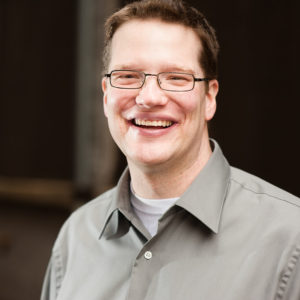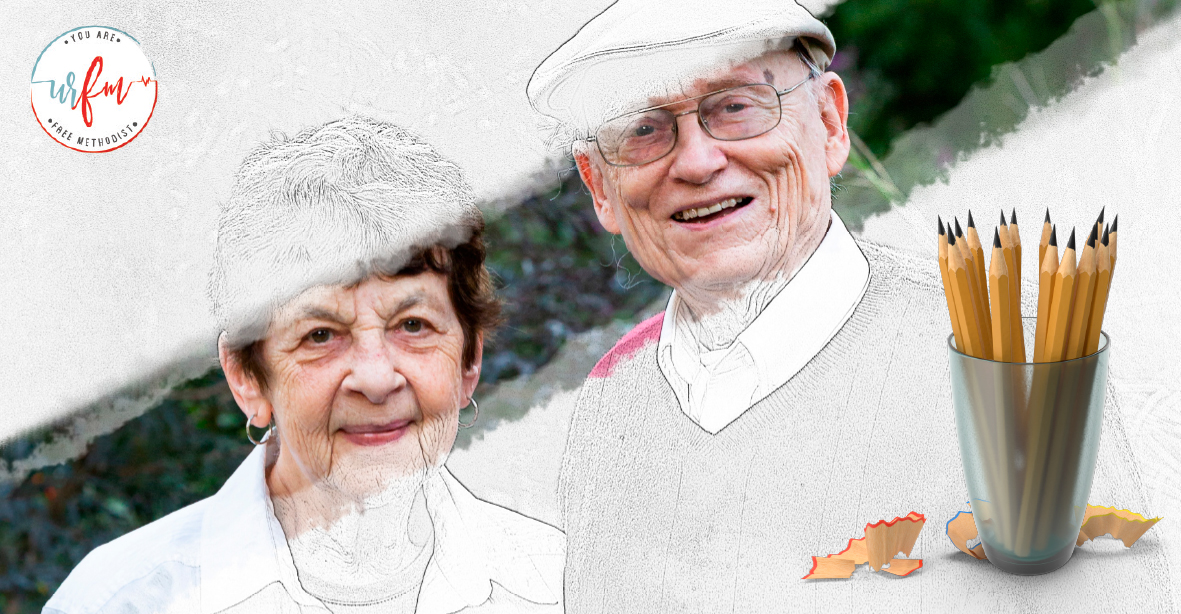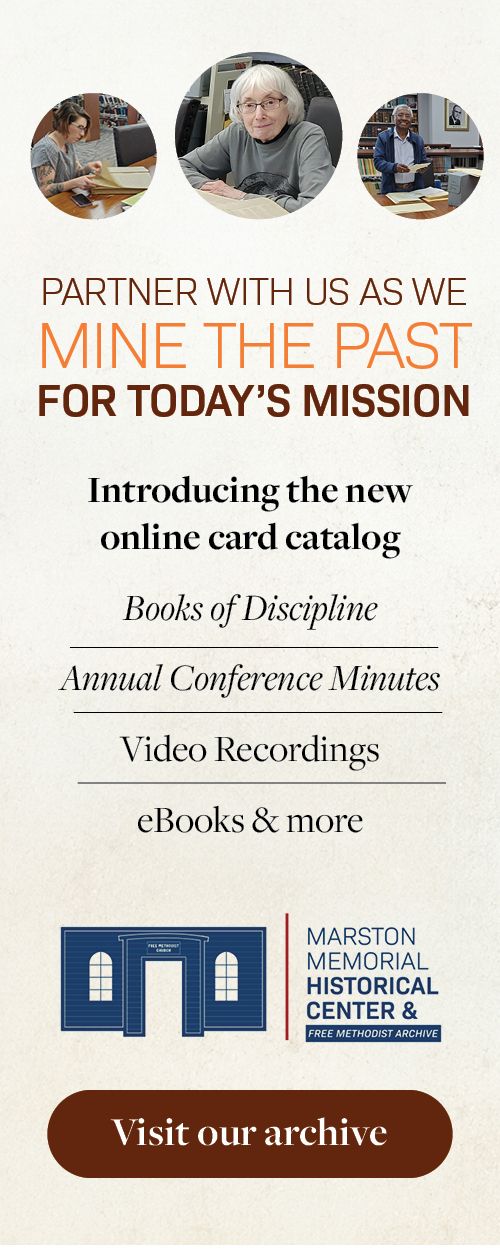
Jeff Finely
Light + Life Executive Editor
Jeff Finley is this magazine’s executive editor. He joined the Light+Life team in 2011 after a dozen years of reporting and editing for Sun-Times Media. He is a member of John Wesley Free Methodist Church where his wife, Jen, serves as the lead pastor.
by Jeff Finley
U. Milo and Helen Kaufmann are known in academia for their intellect and scholarship. For decades within the Free Methodist Church – USA, they’ve also been known as leading advocates of multiethnic and urban ministry.
For example, some historians state that evangelical Christians failed to join the civil rights movement of the 1960s, but that doesn’t apply to these longtime Free Methodists.
“During the civil rights protests many years ago, I got involved with NAACP, and we organized some clubs of junior high age children who were bright and needed to know what careers might be available to them, so we worked with those clubs to help raise the sights of young people,” Helen told LIGHT + LIFE during a phone interview on a busy day for the couple. A few hours later, Milo recorded a video interview with Greenville University that presented him its 2020 Distinguished Alumnus Award.
Also in the 1960s, Helen said, their home congregation — the Urbana Free Methodist Church (now Mattis Avenue FMC) — “had a relationship with a Black church [Mount Olive Missionary Baptist] here in our community, so that the young couples, which included us in those days, would get together for parties and events. When I look back at that and think what the status of Black-White relationships was in those days, it makes me realize that our church did have a conscience.”
Milo and Helen grew up in Free Methodist families and met as students at Greenville where Milo was two years ahead.
“I was editing the Papyrus [student newspaper] about the same time that Helen was editing the alumni newsletter so we had some confluence there,” Milo said.
Milo graduated in 1956, and the couple married a few months later. Milo headed to graduate school at the University of Illinois at Urbana-Champaign, and Helen left Greenville to accompany him. They then moved to New Haven, Connecticut, where Milo completed his doctorate at Yale University, and Helen finished her undergraduate studies at Southern Connecticut State University. They then moved to Chicago for Helen to complete her master’s degree in English at the University of Chicago while Milo did postdoctoral studies in religion and aesthetics and then taught for a year at North Park University.
They returned to the Urbana-Champaign area in 1962. Milo became a professor of English and American literature at the University of Illinois, and Helen became an English instructor and the director of the study abroad program at Parkland College.
Urban Fellowship
One of Helen’s Greenville classmates was Gene Alston, who later became the first African American graduate of Asbury Theological Seminary and then a school administrator in southwestern Illinois near St. Louis. The Kaufmanns hosted Alston in their home in the early 1980s.
“We had 35 people in our house. Gene was expressing something of his career and his concerns as a Black man and a Free Methodist,” said Milo, who relayed Alston’s concerns at the denomination’s next general conference. “That was the founding of the Social Action Council. … I headed that where we had conferences around the country.”
The council conducted a survey of U.S. Free Methodists. Milo said he became concerned when the survey results showed that many people “had absolutely no vision beyond their congregation, because what they were really interested in was ministry to the shut-ins and to their young people to make sure their young people turned out all right. Those are very understandable, but it was altogether ingrown, self-serving without any vision for the cities, and, of course, the cities were increasingly becoming magnets for the population.”
The Free Methodist Urban Fellowship (FMUF) formed to help Free Methodists support and catch a vision for ministry in urban areas. The couple spent nearly a dozen years on FMUF’s coordinating council. Milo served for part of that time as the vice president, and Helen served for a decade as the communications coordinator. She launched FMUF’s initial website and oversaw its internship program.
“The funds we obtained from membership from churches went into a program for training interns in urban ministry,” said Helen, who added that one of the program’s highlights was training “Heidi Lyda, who has been in charge of the LYN House in Indianapolis for many years since that internship.”
Before FMUF formed, the denomination established the Continental Urban Exchange (CUE) conference in 1974 to bring urban Free Methodists together. CUE continued under the direction of FMUF, and the Kaufmanns became regulars.
“I came to the fourth CUE, and I’ve been to all the CUEs ever since,” Milo said.
“From an early age when I was in school, I was always interested in justice for African Americans. I think I inherited that interest from my mother. So when Milo attended several CUE conferences and then I began going with him, … my interest in justice ministry generally increased,” Helen said. “I loved those meetings where people of a variety of ethnicities got together and sang and worshipped together, so CUE was really a high point of the year for me.”
CUE attendance eventually turned into leadership, and they were honored at the 2012 CUE conference and given a plaque to commemorate their faithfulness.
“For about 12 years, I planned the CUE conferences,” Milo said. “One was in Passaic, New Jersey, right on the edge of Manhattan, and we managed to host half a dozen graduate students to see what urban ministry was like. And, of course, Passaic was the fruit of Dwight Gregory’s wonderful ministry over 10 or 12 years, so we had perhaps seven different ethnicities represented in churches there in New Jersey, and our graduate students were duly impressed.”
Milo also credited Gregory with speaking at rural churches where “he would present urban ministry as the new mission field, and the sweet, sainted WMS [Women’s Missionary Society] women would latch onto that.”
Milo organized another memorable CUE in Chicago through a collaboration between Hillside Church, the Free Methodist congregation in the nearby suburb of Evanston, and Olive Branch Mission, which was founded by Free Methodists more than 150 years ago and is now Chicago’s oldest continually operating human service organization.
Helen said another important CUE conference was a 1990s gathering in Lawrence, Kansas, when a group of Black pastors met and “called it the Black Caucus, and, out of that, the African Heritage Network was born.”
When asked to assess where the denomination currently stands, Helen said she is “very encouraged by the evidence I see that African American pastors and leaders are taking real leadership in the denomination.” She said she was particularly inspired by the recent “Talk, Listen & Learn Together” and “Continuing the Conversation” video discussions.
“I also want to mention the many years of ministry by Kathy Callahan-Howell, who is a hero of mine for sticking with a difficult ministry situation in Cincinnati all these years. She’s taken leadership with the Free Methodist Justice Network,” Helen said.
Helen also gave an unsolicited endorsement of Liz Cornell’s “The Love Required of Us,” a Light + Life Press handbook to guide groups of racially diverse people in discussions of race and racial reconciliation. Helen said she met Cornell at the first Embrace All Conference, and then they reconnected at General Conference 2019.
“She had just written this manuscript, and she wasn’t sure what her plans for publishing it were,” Helen said. “I was wanting our small group to do a series about racial reconciliation, so we persuaded Liz to let us use her manuscript as the first version of this book and test it in our small group. We used it for eight sessions and found it extremely helpful and a very excellent way to get a group talking about race.”
Other Ministries
Milo’s other denominational involvement includes serving as the president of Light & Life Men (now Men’s Ministries International) for 10 years during which he visited Free Methodists around the world and served as the organization’s liaison to FMUF.
“We were certainly focusing on the fact that we had a lot of men in our cities,” said Milo, who noted that focus included cities around the world. “Big cities are not just in the U.S. The biggest are in these other countries.”
The denominational men’s ministry supports emerging leaders in the international Free Methodist Church. “In fact, the current bishop in the Philippines [Alan Bacus] was supported on our 2 Timothy 2:2 program, and we met him when we were in the Philippines,” Milo said.
Milo also worked part-time for this magazine. He was a prolific freelance writer for the denomination’s publishing house when he received a job offer from Free Methodist Publisher Lloyd Knox.
“He urged me to become editor of the magazine, but all of the editing I’ve done has been without journalistic experience,” said Milo, not counting his Greenville newspaper work.
Instead of becoming the sole editor, Milo was able to continue his work as a professor while co-editing this magazine from 1970 to 1974 with Robert M. Fine, Donald E. Demaray and H. Frank Van Valin.
The Kaufmanns have retired from higher education but remain busy. Helen serves as both an administrative assistant for Mattis Avenue FMC and as the church’s minister of outreach. For more than a decade, she has overseen the congregation’s ministry program for international residents of the area, and Milo has helped.
“We have five or six conversation classes every week for internationals from a variety of countries, and we have developed a Chinese ministry in our church,” she said. “Before the pandemic hit, maybe a fifth of our congregation was Chinese. We’ve both been involved with internationals in that way and find that a deeply rewarding ministry.”
The classes are offered at different times to allow options for participants’ schedules. The groups are led by school teachers, retired teachers and other members of Mattis Avenue.
“I have found it’s not hard to find people who are willing to meet with internationals to practice English conversation,” said Helen, who added that the classes have included “one for beginning English, which was particularly for Congolese immigrants who have turned up in Champaign-Urbana and who are fluent in French but mostly know very little English. We’ve had people from China, Korea, Brazil, Iran and a variety of other countries. … I praise the Lord that Holly Yan Burns [Mattis Avenue’s assistant for international ministry] has been on our church staff now for years.”
The Kaufmanns and Mattis Avenue FMC also support a Christian organization that is based in their community — where it helps families pay their rent and get food, clothing and health care — and has a research arm with a national impact.
“Over 40 years ago, I helped found the Empty Tomb ministries, and they have 10 local works,” said Milo, who brought Empty Tomb’s leaders to the St. Louis CUE conference. “They have produced 29 annual volumes, which is the very best statistical analysis of church giving in the United States.”
Helen participated two years ago in Greenville University’s travel course, “Justice Ministry: The Gospel and the Politics of Race.” She said, “That pilgrimage really had an effect on me. Since that time, I’ve read a number of books about Black-White relationships.”
Milo has written six books of poetry along with other books of stories and literary scholarship.
“He’s never done. He always says, ‘Now I’m working on my last book,’ and it’s never the last book,” Helen said.+

Jeff Finley
Light+Life Executive Editor
Jeff Finley is this magazine’s executive editor. He joined the Light+Life team in 2011 after a dozen years of reporting and editing for Sun-Times Media. He is a member of John Wesley Free Methodist Church where his wife, Jen, serves as the lead pastor.









